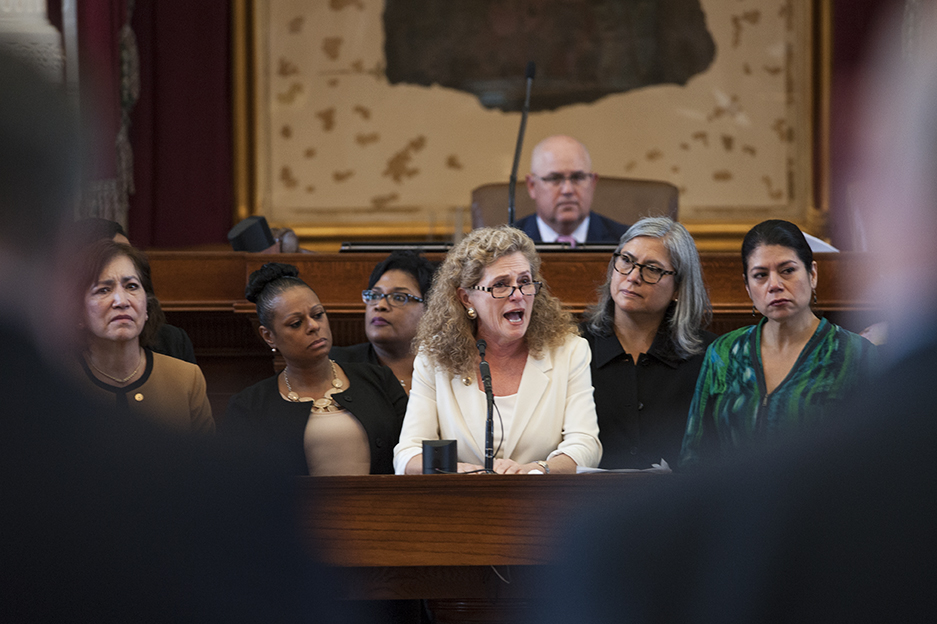
Committee Approves New Sexual Harassment Policy for Texas House
The new policy is the first major change the state has made amid a national wave of sexual harassment allegations that have toppled powerful men in politics, entertainment and media.

Above: State Representative Donna Howard, one of two women on the Texas House Administration Committee, speaks against an anti-abortion bill during the 2017 legislative session.
A Texas House committee unanimously adopted a policy Friday aimed at increasing protection for sexual harassment victims, requiring new training for lawmakers, staff and interns and clarifying the official complaint process. The policy update comes after news reports that women have faced sexual harassment at the hands of staff and lawmakers in the Texas Capitol. It is the first major change the state has made amid a national wave of sexual harassment allegations that have toppled powerful men in politics, entertainment and media.
The five-page policy was developed by members of the House Administration Committee, which sets rules for that legislative body and is chaired by Representative Charlie Geren, R-Fort Worth. Complaints by employees and interns can be reported to a lawmaker’s personnel department or to Geren.
The policy, which takes effect immediately, notes that sexual harassment is “unacceptable,” “will not be tolerated” and is a “very serious matter” that could result in civil and criminal investigations. It also provides specific examples of types of sexual harassment that are forbidden, including “giving sexually suggestive gifts,” “standing too close to or intentionally brushing up against a person,” “posting sexually demeaning or offensive pictures, cartoons, or other material in the workplace” and making acceptance of sexual advances a condition of promotions or awards.
In an effort to ensure that all staff and House members complete the sexual harassment training, the policy also notes that the payroll or personnel department will maintain records of those who’ve passed the training and make their names available to the public. All 150 House members and their staff are required to complete the training by January 31, 2018; however, the policy does not provide details about its content or format. In the Senate, Lieutenant Governor Dan Patrick has asked Senator Lois Kolkhorst to review its policy.
“We know that a lot of people don’t report [sexual harassment and abuse], and part of the reason they don’t report is because they don’t have confidence in the system,” said Representative Donna Howard, an Austin Democrat and one of only two women on the 11-member committee. “I believe that what we’re putting together here is a very big step in the right direction.”
Howard and Geren indicated that the policy would continue to be updated. Geren said he has recommended that Speaker Joe Straus set up a working group to review sexual harassment policies during the interim session.

Sexual harassment by Texas lawmakers, 80 percent of whom are men, has long been an open secret in political circles. In 2013, Olivia Messer, then a legislative fellow for the Observer, reported on the misogynistic attitudes that pervade the Legislature. Messer found that male lawmakers sometimes watched porn on the House and Senate floor, and female lawmakers were routinely demeaned and patronized. During the 2017 session, Geren himself was criticized for being “racist, sexist and downright disrespectful” when he suggested postponing a vote in response to a Latina lawmaker on a hunger strike “to see how hungry she gets.”
In the last couple months, as the national uproar over sexual harassment by powerful men has intensified, the issue has received renewed attention by Texas lawmakers, who called for a review of existing policies. In November, Messer, reporting for the Daily Beast, found that little had changed in the four years since her first report and that women who work in Texas politics had begun a list of “bad men.”
Karen Brooks, a former political reporter at The Dallas Morning News, told Messer that one state senator allegedly asked her, “Why don’t you come over to my apartment and let me chase you around the room?” Brooks said another state representative told her, “I’ve been undressing you in my mind all session.”
Women recounted similarly harrowing stories to Texas Tribune reporters. One woman recalled that a Capitol staffer had licked her hand and refused to let it go. Another former staffer told of when a lawmaker stuck a hand up her skirt.
Yet the Tribune found that no complaints were filed in the House or Senate since 2011, indicating that victims may have avoided filing complaints out of a fear of retaliation.
Soon after lawmakers voted on the new policy at the committee hearing Friday morning, Politico reported that Texas Congressman Blake Farenthold, a Corpus Christi Republican, settled a sexual harassment lawsuit with a staffer for $84,000 using taxpayer funds. The woman says that after she complained of a toxic workplace, she was fired in retaliation.
The new House policy states that such retaliatory actions will not be tolerated and that “remedial actions will be proportional to the seriousness of the offense.” In the case of staff, remedial action may take the form of suspensions, termination or demotion, but the committee hasn’t said how offending legislators would be disciplined.


